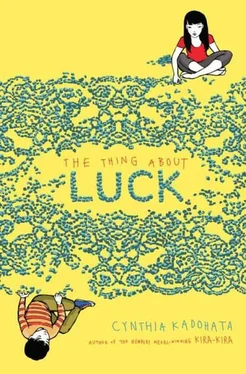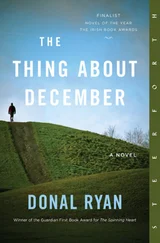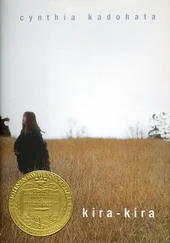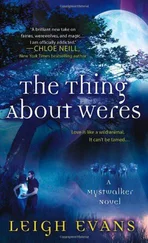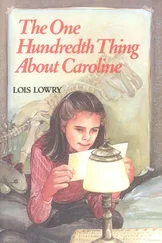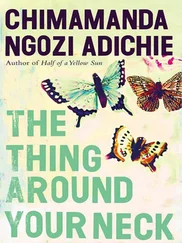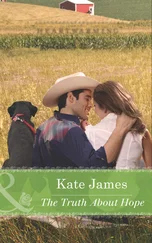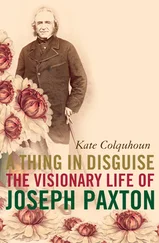The front door of the main house was wide open. Thunder sniffed at the doorway. Jiichan tried knocking, but no one answered, so he knocked harder. Obaachan said, “Summer, you call hello. You talk best.”
She always said that.
“Hello?” I called out. “Hellloo!” Nobody answered, but we could hear voices from inside. “Let’s just go in,” I told my grandparents.
“Oh, no,” Jiichan said. “Not polite.”
“Never go inside if nobody let you in,” Obaachan agreed.
“Then we’re just going to have to wait here,” I said. “But the door’s open. That means we can go inside. I’m sure it’s okay.”
“No, not okay,” Jiichan said, shaking his head.
“Helloooooo!” Jaz suddenly shrieked.
There was an abrupt silence from inside, and then Mr. and Mrs. Parker came to the door. “Toshiro, Yukiko, come in. You don’t have to knock!” Mrs. Parker said.
So we took off our shoes and entered. We were wearing running shoes that were identical except for being different sizes. The Parkers’ house was pretty inside. A wedding-ring quilt, all in shades of pale blues and yellows and pinks, hung on the wall facing the front door. A quilt was one of two things I had always wanted. The other thing was a wicker chair for the front porch. “What kind of girl wants a wicker chair?” my mother had asked when I’d told her that. I knew why she said that. I mean, the other girls at school coveted smartphones. I would rather have had a wicker chair. Melody thought I was nuts.
I loved the Parkers. They had one son, Robbie, but he was kind of boring. I guess I would play cards with him if I were desperate, but he wasn’t interesting like his parents. Mrs. Parker was all business a lot of the time, but she was very kind, and if anyone got hurt, she was all over them like a Band-Aid. She was a large woman with a strong, caring face, the sort of face that made you like her right away because she was nice, but you knew you couldn’t take advantage of her.
“Summer, you must have grown three inches,” she exclaimed, giving me a hug.
“Yes,” I said politely. “I think it’s been exactly three inches since you last saw me.”
Mrs. Parker’s hair was dark reddish, and she had the greenest eyes I’d ever seen. And Mr. Parker reminded me of the president or something—a man who chose to have the weight of the world on him.
“Great, you’re here,” Mr. Parker said, clapping his hands together once. “We were just talking through our plan for the north part of harvest. Since we have only a thousand acres in South Dakota, we can split up there. Some of us can go on to North Dakota.”
I thought it was pretty nice of them not to mention that we were at least half an hour late. Everyone else was ready to go. It was weird because my grandparents were always saying it was important to be punctual, and they were always rushing around to be on time, but they were almost always late. Sometimes they would start getting ready for something before my parents started, and they would still be late. In fact, the only time I could remember them being on time for anything was for Jaz’s meeting-party. They had really wanted that day to be a success.
We followed the Parkers into the kitchen, which was crowded with all the workers they’d hired. In the middle of the room was an island surrounded by stools with green cushions that said JOHN DEERE on them. John Deere made stools?
“Lonny, it’s a little more than a thousand acres in South Dakota, and there’s a chance of finding more,” Mrs. Parker gently argued, getting back to the discussion our arrival had interrupted. “So can’t we just plan not to have a plan?”
“I guess that’s the same plan we have every year,” Mr. Parker said, and everybody laughed.
I couldn’t wait to get to the Badlands. I’d been there on two different harvesting trips. In the Badlands you could see rocks of every color and shape. One time, over unending cliffs of gray rocks, we saw a cloud-and-fog storm approaching, as if it were aiming right for us. I had never been so scared or so excited. We didn’t want to get caught in the fog because then we might have to stay put until we could safely return to our car—What if we walked off a cliff in the fog?
And yet we couldn’t leave—it was if the rocks were holding us there. I mean, they were only rocks. But for some reason, those rocks made lonely feel good. Those clouds made you dream big. Not big like you could make a lot of money or like you could have a good job. Bigger than those things. It was complicated. I mean, big like you were part of the sky, which also made you feel small. I don’t know how to explain it! The last time I had been there, we’d seen tan rocks shaped like the hides of some sort of animal. Nobody will ever convince me that those rocks weren’t as alive as I was. They were just on a different timetable.
“Have some coffee, and then we should get going,” Mrs. Parker said to my grandparents. I pulled my mind away from the rocks as Mrs. Parker began to gesture toward the workers one at a time. “This is Sean Murphy, Rory O’Brien, and Mick Ryan. They’re from Ireland. And this is Bill McCoy and Larry Dark. They’re American. Folks”—now she was pointing at us—“Toshiro and Yukiko Sakata and their grandkids, Summer and Jaz.”
Many custom harvesters hired non-Americans. The Parkers hired their foreign employees legally through an agricultural program at Ohio State University. The employees got paid by the month, regardless of whether they worked sixteen-hour days or hardly any hours because of rain—it was impossible to harvest during a rain because combines can’t thresh wheat if it’s too moist. Since the hours could be really long, and you had to live for months at a time in a camper, the custom harvesters found that foreign employees were more likely to stick with the job than Americans.
This is how nice the Parkers are: At the end of every season they always take the employees on a special trip, like to a big city or to a NASCAR race. We went to NASCAR with them once, and I have to say that sitting for hours in the sun and watching a bunch of cars speed by me was about the most upside-down day of my life. I mean, everyone—even Jiichan—got all excited when there was an accident right in front of us. If you were a nice person, such as my father and Jiichan and the other workers, why would an accident excite you? It was like all the rules about driving that applied in the outside world didn’t apply at NASCAR. Then a bunch of men who worked for NASCAR helped the driver out of his car, and blood dripped down his forhead. He wasn’t hurt badly, but still, it was totally bizarre how excited everyone was. My dad said I just didn’t understand men and cars, and what they meant to one another, and I said, “Amen to that,” and my mom laughed out loud—she always says that.
Anyway, the two Americans were older, probably retirement age, like my grandparents. The Irish guys looked like they were in their twenties. Irish workers always used the word “lads,” but I thought of them as “guys.” “Lads” just didn’t sound right. All the men wore jeans and T-shirts with writing or pictures on them. Mr. Dark’s shirt said KEEP AMERICA FOR THE AMERICANS, and Rory’s said THE NUMBER OF THE BEAST, which was an Iron Maiden record from way back in the early eighties. Some guys at school were obsessed with that music. My grandparents didn’t believe in such T-shirts, because why should you pay to advertise for someone else? I had tried to explain to them that you could use T-shirts to express yourself. Jiichan had shaken his head and said woefully, “No can be different by doing same thing as everyone else.”
“Will youse two be driving combines, then?” Mick asked. The Irish guys from our last harvest did the same thing—used “ya” for “you” in the singular and “youse” for “you” in the plural. Isn’t that cool?
Читать дальше
